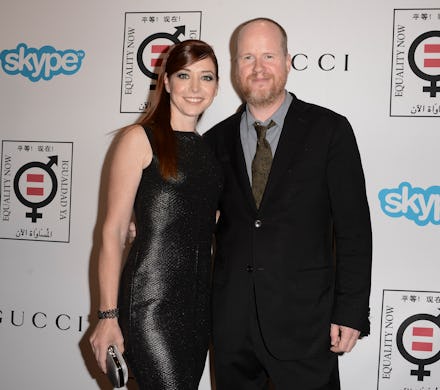Joss Whedon Redefines Feminism In the Same Way Feminists Have For Years

Joss Whedon spoke at an Equality Now benefit dinner recently and decided to take that opportunity to redefine the word feminist.
That’s nothing new. Every day that ends in "y" involves people declaring feminism dead or in need of a rebrand. It’s like a gender-based version of the movie Groundhog Day.
The narrative goes like this: women of color offer criticism of mainstream feminism that falls on deaf ears then either a white woman or man write a similar criticism and it goes viral. Whedon did not invent criticisms around the word "feminist" even if he is the first person who I’ve ever heard take issue with the cacophony of the word. Whedon’s talk and the ensuing frenzy of critique are not just happening because women are never happy.
"I hate 'feminist,'" said Whedon. Not feminists, but the word "feminist." His reasoning was sound — it’s harsh and Germanic. It hisses. Feminisssst. But it wasn’t just the noise Whedon says. He argues that the "ist" includes the idea that equality, that feminism, is not a natural state.
By speaking of a natural state, Whedon subtly invokes Locke’s philosophy that people are born as blank slates. This is utopian, but not realistic. We may be born equal, but the differential treatment of men and women begins very early. In her book, Pink Brain, Blue Brain, Lise Eliot explains that gender essentialist principles start at the time we wrap little boys in blue and little girls in dresses, and from there on the gender roles don’t stop.
Feminism can’t be defined by a man. That defeats the point. It is a movement towards equality, and one that has arguably created room for men to deconstruct masculinity, but feminism can’t function if male’s voices are privileged over women’s voices. White men have almost always been seen as more human, while women have historically been considered property.
When a woman looks in the mirror, as Michael Kimmel said at an event hosted by Paradigm Shift, she sees a woman. But when a man — a white straight middle class cisgender man, at least — looks in the mirror, he just sees a person. There’s a confirmation of his body as normal everywhere he looks in society. For him, it is possible to live without having to think too closely about race or gender.
It’s not that white men can’t care about these issues, or even that they can’t have a difficult go at life, but they haven’t lived through the experiences of the people that they are talking about. Whedon is, though not by his own design, someone who gets to reap the benefits of living in a world where women are women and men are people.
The reality is that Whedon, in his position of privilege, can ignore the gradation of work that many women have put in to the expositions of feminism and still be praised as though his idea was novel. There are many contemporary critics of feminism and inclusion: Mikki Kendall, Trudy Hamilton, Lauren Chief Elk, and many many more.
Why then, would someone like Whedon be given the space to redefine feminism? As Flavia Donovan writes of his speech, he added in the enduring habit of ignoring the critiques of women of color. He focused instead on the reason why Katy Perry would choose not to call herself feminist — as thought there is not a possible reason not held by a rich, white woman.
It is troubling that women on the margins are called divisive when they reject feminism in favor of ideas like womanism, and yet a man like Whedon critiquing the exclusionary ideologies that can be inherent in feminism gathers positive attention.
The problem isn’t Whedon and his views on feminism; it is the focus on his views of the same thing women have been saying for years.
Let me know what you think in the comments or on Twitter.